FEELING SORRY IN THEIR SORROW
By Mr. B. K. Misra
Sowing the Seeds of Compassion
“Aha! You are just like me”. My grandma took a handful of rice from her plate and offered it to him. A black crow hopping on one leg came near her, filled his beak with it and flew away.
A 15-year old caught this spectacle from his window, in one of his siestas on a sunny noon. It did not seem to have made any perceptible mark on him then. But the seed was planted, and fifty years later, when he is already a grandpa, the seed is still growing!
It took him years of rigorous training in Bhagavan’s school of compassion to see the salvation of the world in that seemingly insignificant incident.
Is it really an insignificant incident?
My grandma had a fall a few months earlier; a little over 70, her leg never really healed. So, she lived the rest of her life with a stiff left leg. She moved around with a cylindrical empty tin container as her support. When she sat, she spread her damaged leg full length. She had no complaints on her lips though. I don’t remember hearing her wishing to God to remove her own suffering, but I remember her having asked God several times, almost daily, when the crow came to her for his daily mouthful, to heal him.
I use a human pronoun for the crow for he represents to me the ailing humanity.
 |
Feeling Another’s Pain
It was the middle of winter, and my grandma needed a thick blanket for her old bones. My father bought her one at the onset of winter, and she loved it. One day, grandma was up rather early in the morning and asked for a little fire made for her. Her teeth were chattering in the morning chill. Mother made her the fire, and she sat by it to warm herself. When my mother went to roll up her bed, she did not find the blanket. She looked around for it in surprise, it wasn’t in the room at all! She came back and asked grandma about the blanket.
“It must be lying there somewhere”, replied grandmother rather nonchalantly.
“No, it isn’t there in your room at all. Didn’t you use it at night?” mother asked.
When the individual ego takes a dip in the sea of compassion, it loses its identity as a river in a sea. Compassion identifies one with the rest of living things. It creates non-violence, understanding, patience, tolerance, love, non-attachment, and self-sacrifice. It makes man divine, and the Divine human. |
Grandma kept quiet. Later, with a lot of coaxing the story tumbled out.
The previous day at dusk she noticed through her window a beggar woman with hardly any clothes on. She thought to herself, “The nights must be so terrible for her. I have a roof for shelter, but what about her?”
Grandma called the beggar woman to the window, handed over her blanket to the woman, and asked her to run away before any one of the family notices it. She showed her gratitude with a silent tear and ran away. My grandma said she too wiped a tear of joy.
An insignificant incident? Yes, while big bangs build galaxies, such silent tears build our souls. And sadly our souls today need to be built.
Sharing Other’s Joy – the Test of Progress
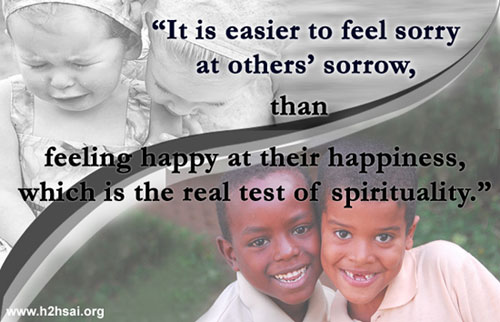 |
Years ago Swami said in a sevadal convention, “It is easier to feel sorry at their sorrow than feeling happy at their happiness, which is the real test of spirituality”, and then He added, “But you have lost even that capacity to feel sorry at their sorrow!”
I remember once I asked a grade XII student of our school (Sri Sathya Sai Higher Secondary School, Prasanthi Nilayam) after the Grama Seva (village service programme) about his experiences in the project. He replied, “I did not know there is so much happiness in giving joy to others. After the distribution of food and clothes, watching the happiness and gratefulness of the simple villagers, I sometimes forgot my lunch.”
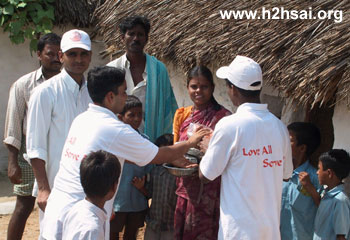 |
|
The students from Sai schools and colleges go into the surrounding villages and distribute food and clothes every year |
He felt sorry at their sorrow, and then felt happy at their happiness. And this even removed his hunger. Isn’t it so true when Swami often says that mind is the cause even of our physical state?
My old grandma, and the grade XII student had something in common: they identified themselves with the other person, in one case it was a crow, in another a human being.
This is all about Compassion. Compassion for a crow or a human being produced the same effect on them – they forgot themselves. Doesn’t it prove all life is ONE?
Compassion – The Proof of the Oneness of Creation
Compassion enlarges the capacity of our souls, it expands in a feeling of love. Swami always says, “Contraction is death, expansion is life.” When the individual ego takes a dip in the sea of compassion, it loses its identity as a river in a sea. Compassion identifies one with the rest of living things. It creates non-violence, understanding, patience, tolerance, love, non-attachment, and self-sacrifice. It makes man divine, and the Divine human. We see everyday how the Divine becomes human in His countless actions of compassion. Isn’t the entire mission of Swami a result of His shoreless compassion?
“An educated heart must be filled with compassion.” |
Whenever you watch Him becoming just human, you feel you have taken a dip in the holy Ganga, and feel elevated in purity. So purity is the platform where humanity and Divinity meet.
Isn’t compassion therefore a way to our essential purity, on our journey towards Divinity?
When my grandma gave away her blanket to that woman, she didn’t wonder, “It is my blanket, bought by my son for my comfort.” She simply thought, “This blanket is needed by the woman to save herself from the terrible chill. So, she should have it.” Compassion thus expands ‘I’, makes it ready to share whatever comes to it with people who have less of it. Compassion manifests as spiritual osmosis.
We had a little poem story in our language syllabus in the school. Whenever my brothers and I sat around a kerosene lantern to study, my grandma would come and ask me to read that poem aloud. It is a sad poem about the death of a bride, the only child of her parents, in her first journey to her in-laws. She had to travel on a boat across a stretch of treacherous waters; the boat sank in a storm, killing her. Grandma would listen to the poem with closed eyes, and would cry every time one of us read it to her. I remember Wordswoth’s Solitary Reaper where he says -
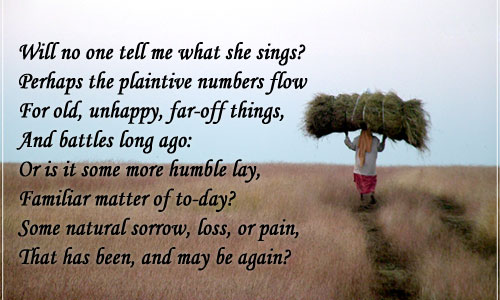 |
If you can enjoy it, Wordsworth says,
Stop here, or gently pass.
The Divine Path of Sharing and Giving
But Swami offers us no such option, nor did my grandma. If we refused to read the poem to her, for who would, at our age, bother to read such a sad poem everyday, she would say all our education was a waste, and walk away. Swami also insists, “An educated heart must be filled with compassion.” The entire seva programme of the Sathya Sai Seva Organisations is actually a ‘compassion-extension programme’.
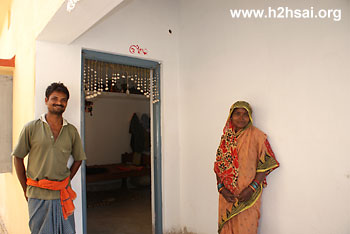
|
We have been closing our eyes to the suffering of our fellowmen, not even passing it by gently; we have been haughty enough to ignore it. Bhagavan said we can not pass it by even gently, we have to stop, and share our tears with their “natural sorrow, loss or pain.” Swami shows it in countless ways, in the water projects, in the multi-crore super hospitals, in the Deenodharana project at Prasanthinilayam, the Vridhashram at Brindavan, and now in building houses for the flood-affected people in Orissa. To teach compassion, He has introduced the amazing Grama Seva project which His students and staff have been participating in for more than a decade now.
Compassion helps us to pray well, for it blunts the powerful edge of ego. When we develop empathy, our sympathies become less tainted with ego. We develop a kind of liquid magic that can flow unto God more easily. I am reminded of a powerful incident from my grandma’s life.
We were staying in a place infested with mosquitoes. In those days, a little more than half a century ago, malaria was fatal and my father fell a victim to it. His body temperatures would shoot up to 105 *F and stay for days. A heavy dose of quinine had to be administered. This went on for more than a week. When one day it nearly touched 106, my grandma took over. She strode into my father’s bedroom, drove the doctor away, put a little mud she had collected from the roots of her ‘Vrindavati’ as the saivite mark on forehead, and sat by him alone praying. She worshipped a Tulsi plant every day with milk-rice and some incense, went around it a few times and sat before it with closed eyes for a long time. She called it ‘Devi Vrindavati’ (Goddess Vrindavati). Grandma left the side of my father’s bed only when the temperature came down to 100 around dusk. Father was normal the following morning and recovered in a week.
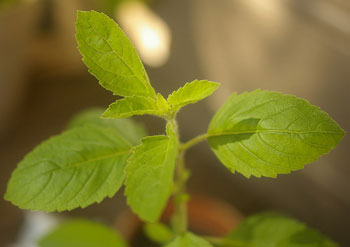 |
Tulasi - The Holy Basil, which is 'Devi Vrindavati' for many devout Hindu women |
My grandma passed away ‘gently’, without even suffering from a sneeze. When she lived we failed to notice her immense geniality, her profound humanity and her almost divine compassion, because we didn’t have time to notice it! The good kind Lord has given us this time we call life only to notice His hands and feet everywhere, notice the beauty of His smile in a flower, in a child, and in an act of compassion. In the words of Jesus, another apostle of compassion, “What is the use of gaining the whole world, if you lose your own soul?”
Dear Reader, did this article inspire you in any way? Do you have a similar story to share? Please tell us your reflections about this article by writing to h2h@radiosai.org mentioning your name and country. Thank you for your time.
- Heart2Heart Team





